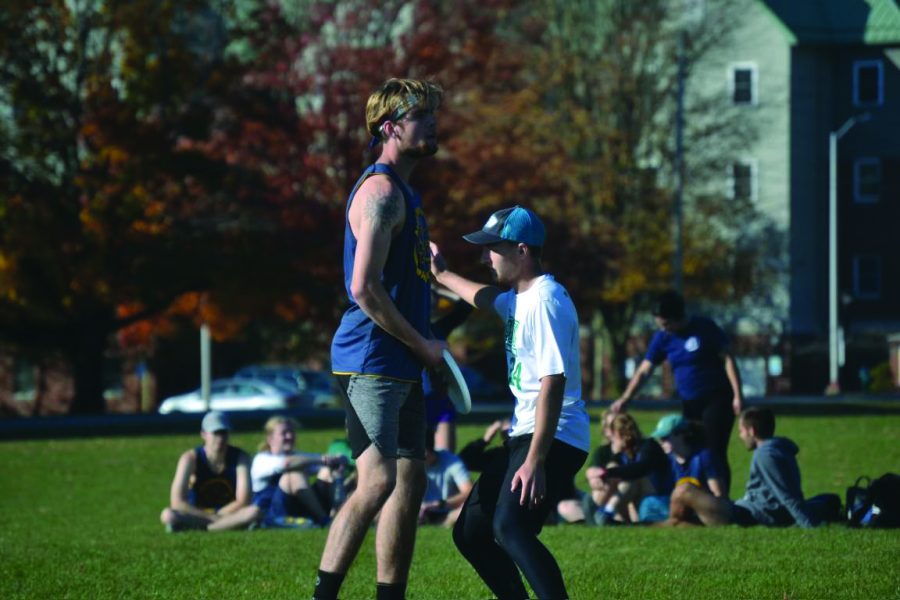Sustainability Coordinator Kelly Boulton, ’02, is currently serving as a member of the fracking advisory group on campus, working with Allegheny’s website director to compile a web page that would make all the information the group has learned about fracking available to the college community.
Boulton, who graduated from Allegheny with an environmental science degree, said fracking is a complex topic.
“A month ago, I didn’t know the ins and outs of [fracking],” she said.
She said that she and the other members of the advisory group are still learning.
“Fracking is such a polarizing issue,” she said. “If you type it into Google you can get the ‘drill baby drill’ or ‘no, absolutely not.’”
Boulton said she wants to take what they learn about fracking and turn it into something that students can use.
“How does Allegheny cultivate a process that teaches students so they can teach their families and communities?” she wants to know.
Boulton said that the process of learning about fracking and making decisions is just as important as the outcome of those decisions.
“Outside of the subject matter, it’s an important process for students to grapple with,” she said. “The types of decisions we are going to have to make in weighing all of these different factors is something that once [students] graduate and are in a working environment are skills that [they] will need to know.”
Boulton also participated in this type of collaborative decision-making while she was a student at Allegheny. As a student, Boulton was part of an informal environmental task force, comprised of students and faculty who met to discuss sustainability issues on campus. The task force evaluated Allegheny’s sustainable practices, and laid out a document to decide what Allegheny should do to be more environmentally responsible.
Essentially, Boulton helped to create the job position she holds today.
“We actually suggested that the college create the position of sustainability coordinator,” Boulton said.
Former President Richard Cook supported the ideas suggested by Boulton and the taskforce. However, Boulton said that nationally, the campus sustainability movement was just beginning, and Allegheny was not yet ready to make its move.
When Boulton graduated in 2002, she intended to pursue her interests in community-supported gardening and organic agriculture.
She worked for three years as a growing manager at Angelic Organics, an organic agriculture company in Illinois. Boulton returned to Meadville to work with the French Creek Valley Conservancy, and then, she received a call from her alma mater.
“Allegheny created [the sustainability coordinator] position, and luckily I was able to snag it,” she said.
Boulton said that she shares this story because she understands that students get frustrated when they do not think their opinions are being heard.
“The reality of it is, you’re being heard,” she said. “Things are happening.”
Boulton is living proof.
As sustainability coordinator, Boulton’s primary job is to uphold the American College and University Presidents Climate Commitment. This agreement, signed by the college in 2007, was the primary reason for Boulton’s hire.
The colleges and universities that agree to this climate commitment make a pledge to increase their campuses’ sustainability practices. Their main effort is to reduce emissions that contribute to global warming.
In adherence to this commitment, Boulton drafted a plan that would make Allegheny College climate neutral by 2020.
Boulton’s duties, which she said were initially sparse, have expanded. In addition to her responsibility of keeping the college on track with the climate commitment, Boulton works with the entire campus community.
“I don’t think there ever really is a typical day,” she said.
Boulton said she currently reports to finance and planning, collaborates with the director and tradesman at the Physical Plant and meets with the student body.
Boulton said that sustainability-focused events like October’s Energy Challenge and the “trashion” fashion show happen every year, but new student-proposed initiatives such as the bike share and free store make her job fun.
“Out of the blue [students] want to make jewelry out of recycling,” she said.
Junior Taylor Hinton, an environmental studies major, is one of three student EcoReps who work on campus under Boulton’s guidance. Among other responsibilities, the EcoReps work to promote sustainability awareness on campus by organizing events, inviting speakers and helping with events such as the Energy Challenge.
Hinton said that she appreciates the attention Boulton pays to students, and that without Boulton, the EcoReps could not accomplish all that they do.
“She must understand that students make a lot of things happen,” Hinton said.
Boulton notes that her experience as a student at Allegheny has allowed her to successfully and productively interact with the campus community. She said that she understands the student body and remembers many faculty members from her time as a student.
“I know who’s interested in what, and how sustainability can overlap with their work,” she said.
In addition to internal sustainability reforms, Boulton also understands the need to educate the Allegheny community about broader environmental issues.
This collaboration of information between students and faculty makes Allegheny unique, Boulton said.
“That’s why the Allegheny program is so good—not just the environmental science department, but across the board,” she said. “I think our education here is great because we involve students in the action.”
Matthew Ferrence, assistant professor of English, integrates environmental philosophy into many of his courses and agrees that student awareness and involvement is essential to discussions about sustainability.
“One should assume that their input is valued, that what they have to say about [environmental issues] matters,” Ferrence said.
Boulton said that she values the opinions of the campus community and the capability of their ideas to elicit change. Once a student and now the sustainability coordinator, Boulton said that it is gratifying to have had the opportunity to watch the institution grow.






